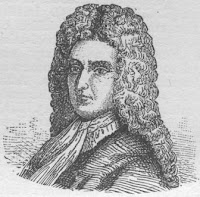 |
| Daniel Defoe (from 1881 Young Folks Cyclopedia of Persons and Places) |
It’s uncertain when exactly Daniel Defoe (originally Foe) was born and where, but it must have been in the area of London around the year 1660. His father was a butcher and a Protestant Presbyterian which made the family subject to discrimination and hostility from the governing Anglican majority. Daniel Defoe and his family survived the Great Plague of London in 1665 as well as the Great Fire of London in 1666. His mother died, when he was about ten years old. In the 1870s Daniel Defoe attended Reverend Charles Morton's academy near London to become a Presbyterian minister, but eventually decided to go into business.
Daniel Defoe wasn’t a particularly successful businessman. During most of his life he was in debt and in 1692 he actually went bankrupt. Besides he had a strong interest in politics that more than once got him into trouble because he wrote pamphlets against the king’s policies. Only between 1689 and 1702, during the reign of King William III whom Daniel Defoe admired, he supported the government writing pamphlets and his famous poem ‘The True-born Englishman’ that opposed the prevalent xenophobia against the King who had been born in the Netherlands. During this time Daniel Foe also prefixed his surname with the gentlemanly “de” and became Daniel Defoe.
When Queen Anne ascended the throne, Daniel Defoe was once again subject to persecution for not being a member of the Anglican Church and aggravated his situation writing a satirical pamphlet in favour of religious tolerance that wasn’t well received by the authorities. He had to stand in the public pillory and was imprisoned in Newgate. The experience didn’t break Daniel Defoe. He continued his fight, although less openly, and started a newspaper called Review in 1704 that existed until 1713. From 1704 on he also worked as a spy for the government and he wrote political essays for the party in power as well as secretly for the opposition along with works on business and social issues.
Only in 1719 Daniel Defoe became a novelist writing his great literary masterpiece ‘The Life and Strange Surprising Adventures of Robinson Crusoe’ that was received by readers with immediate acclaim. Two – less famous – sequels to ‘Robinson Crusoe’ and the novels ‘Captain Singleton’, ‘Memoirs of a Cavalier’, ‘A Journal of the Plague Year’, ‘Colonel Jack’, ‘Moll Flanders’, and ‘Roxana’ followed until 1724. In his final years Daniel Defoe wrote essays and books about business, politics and morality again. Altogether more than 200 written works (poems, fiction and non-fiction) are ascribed to the prolific writer who is known to have used over one hundred pen names.
Daniel Defoe died in April 1731 in Bunhill Fields, London.
When Queen Anne ascended the throne, Daniel Defoe was once again subject to persecution for not being a member of the Anglican Church and aggravated his situation writing a satirical pamphlet in favour of religious tolerance that wasn’t well received by the authorities. He had to stand in the public pillory and was imprisoned in Newgate. The experience didn’t break Daniel Defoe. He continued his fight, although less openly, and started a newspaper called Review in 1704 that existed until 1713. From 1704 on he also worked as a spy for the government and he wrote political essays for the party in power as well as secretly for the opposition along with works on business and social issues.
Only in 1719 Daniel Defoe became a novelist writing his great literary masterpiece ‘The Life and Strange Surprising Adventures of Robinson Crusoe’ that was received by readers with immediate acclaim. Two – less famous – sequels to ‘Robinson Crusoe’ and the novels ‘Captain Singleton’, ‘Memoirs of a Cavalier’, ‘A Journal of the Plague Year’, ‘Colonel Jack’, ‘Moll Flanders’, and ‘Roxana’ followed until 1724. In his final years Daniel Defoe wrote essays and books about business, politics and morality again. Altogether more than 200 written works (poems, fiction and non-fiction) are ascribed to the prolific writer who is known to have used over one hundred pen names.
Daniel Defoe died in April 1731 in Bunhill Fields, London.
No comments:
Post a Comment
Dear anonymous spammers: Don't waste your time here! Your comments will be deleted at once without being read.